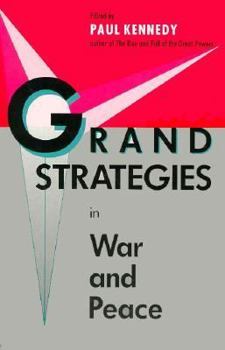Grand Strategies in War and Peace
Select Format
Select Condition 
Book Overview
In this important book, eminent authorities discuss how various nations have sought to integrate their political, economic, and military goals in order to preserve their long-term interests in time of... This description may be from another edition of this product.
Format:Hardcover
Language:English
ISBN:0300049447
ISBN13:9780300049442
Release Date:May 1991
Publisher:Yale University Press
Length:228 Pages
Weight:1.20 lbs.
Dimensions:0.9" x 6.4" x 9.6"
Customer Reviews
2 ratings
Gems by Kennedy, can safely skip the rest
Published by Thriftbooks.com User , 16 years ago
I've had this book in my library for many years, but finally pulled it down for a flight to Oklahoma. Bottom line: the gems from the editor in the introduction and conclusion are alone worth the price of the book, you can safely disregard virtually all else. At the end of this review I list some more useful books on grand strategy that merit being read in their entirety. This book is 17 years old, and hence does not reflect the 4th generation through 7th generation warfare thinking of Max Manwaring, Steve Metz, myself and many others, nor does it reflect the globalization versus jihad and the class war of immoral capitalism. Gems: + Grand strategy is about LONG-TERM interests, not a single Administration's "legacy." + Grand strategy demands the integration of the political, economic, and military (this is not good enough. The US military uses DIME for diplomatic, informational, military, and economic, but my own matrix, documented in my early papers at OSS.Net, distinguishes among: - Political-legal-military - Socio-economic - Ideo-cultural - Techno-demographic - Natural-geographic More recently, to help a presidential contender, I took the ten-high level threats to humanity spelled out in A More Secure World: Our Shared Responsibility--Report of the Secretary-General's High-level Panel on Threats, Challenges and Change, reviewed all the Mandate for Change books going back 20 years, and identified the following twelve policy areas that must be harmonized over time AND (this is IMPORTANT): demonstrated to Brazil, China, India, Indonesia, Iran, Russia, Venezuela, and Wild Cards, so they do not repeat our mistakes. The ten grand strategy LONG-TERM policies are: - Agriculture - Diplomacy - Economy - Education - Energy - Family - Health - Immigration - Justice - Security - Society - Water + Moral resources join human and technical and economic resources as being fundamental to ways and means. + Husbanding and managing natural resources for the long-term is vital. + Diplomacy is vital (the US spent $30B on this in 2007, against $950B on waging war--in 2008 the Department of State is being down-sized to help pay for the Iraq debacle--this is plain NUTS. + Flexibility and frequent adaptation are essential (as opposed to the village idiot mantra, "stay the course") + A true grand strategy has at least as much to do about maintaining a prosperous peace as it does with executing a costly war. + Balance in all things among military and non-military, short and long term etc. is critical attribute of sound grand strategy. + The US is now strategically vulnerable on all fronts, not least because we allowed our corporations to externalize costs and eliminate home-front capabilities without regard to national prosperity or security. + The elements of grand strategy have a multiplier effect on one another. If they are left unattended, the Nation hollows out. + Armed forces should be able to deal with multiple contingencies, not just a worst ca
Very interesting
Published by Thriftbooks.com User , 19 years ago
Historically, discussion of "grand strategy" was discussion of the operation of a war. In this interesting book from 1991, author and historian Paul M. Kennedy tries to broaden the definition of grand strategy to include the husbanding of national resources to support a war effort (even before a war actually begins), the use of economic and diplomatic weapons against an opponent, and the working towards a desired post-war peace. This book is a collection of some nine essays, each by an eminent authority (including future U.S. Secretary of State Condoleezza Rice). The first three essays look at British grand strategy during the War of the Spanish Succession, World War I and World War II. The next four essays look at the grand strategies of the Roman Empire, seventeenth century Imperial Spain, Imperial and Nazi German grand strategies, and French grand strategies in the two World Wars. The eighth essay (the one by Condoleezza Rice) looks at Communist Russia's grand strategies from the beginning of the Soviet Union to the Brezhnev era. The final essay was written by Paul Kennedy himself, and suggests how American grand strategy should look to function in a multipolar world where America has been overtaken by other powers in key measures of national preeminence. Overall, I found this to be a fascinating book, with Eliot A. Cohen's essay on Churchill and World War II Britain being the very crown of the book. The final essay on the United States has been overtaken by events, with the U.S. still maintaining preeminence in spheres in which Professor Kennedy foresaw eclipse. But, that said, this is a fascinating read. Also, it does make one see how the recent administrations (both Republican and Democratic) have not pursued a grand strategy that has left America fully ready to deal with future wars, supported by broad alliances, or pointed towards a brighter post-war world. So, let me just say that this is a very interesting book on national grand strategy, one that will give anyone a good deal of food for thought. I highly recommend this book.






